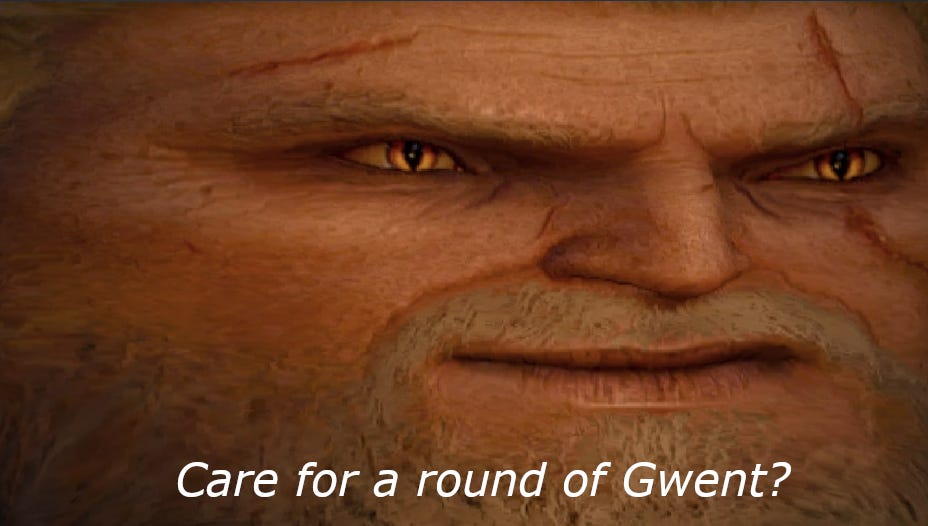5 Takeaways from the Perfect Minigame
Care for a round of Gwent?
You're a merchant.
Business isn’t exactly booming. Four days ago, a basilisk attacked the village again, scaring people so badly they barely dare to step outside. Rumor must have spread quickly because the number of travellers passing through has nearly dropped to zero.
But there's a glimmer of hope. A man with two swords, white hair, and broad shoulders is riding into town. His face is as fearsome as the monsters he's slain. Now, he walks up to your stall, leans on it with his arm, and looks at you with stern and cold eyes. Trouble’s brewing. He says:
When somebody says minigames, one of the first examples that always comes to mind is Gwent. A minigame that is so beloved that its developer, CDPR, decides to turn it into a standalone game. But why? Why is this card game so popular, and what can we learn from it? Let’s find out!
Why Is Gwent the Perfect Minigame?
Even if you haven’t played The Witcher 3, you’ve probably heard of Gwent, the card game that’s become one of the game’s most iconic memes. It’s a minigame entirely separate from the main story, one that you can play with various merchants throughout the game, and sometimes even with key characters. It’s such an engaging minigame that many people, myself included, end up setting aside the main quest just to spend hours playing Gwent. It’s the perfect minigame in my eyes and here’s why.

1. It’s optional
Don’t want to interrupt a mission to rescue someone you consider almost like a daughter just for a card game you’re not interested in? Then don’t. If you prefer, you can completely ignore Gwent and carry on as if it doesn’t exist in the game. Or, you can play a few rounds, take a break, make some progress in the main story, and come back to it whenever you feel like it. It’s all up to you.
2. Different from the main game
In the previous article about the fishing minigames, I mentioned that one of the main purposes of minigames is to give players a break from the main game and a chance to rest their minds. To achieve this, it’s important for the minigame to be as different as possible from the main gameplay. Gwent accomplishes this perfectly as a simple card game, offering an experience that’s completely different from the rest of the game.
3. Collect ‘em all
One of the elements that makes card games so addictive is the underlying “collect them all” motivation. We all love collectibles, and Gwent taps into that. Throughout the game, you can collect all the cards by simply playing Gwent or buying them from various merchants. More cards mean more deck variations. (But let’s be honest—you’re going to build Nilfgaardian deck full of spies).
4. Simple enough for a minigame, complex enough to stand alone
The rules of Gwent are pretty simple: the player with the highest point in two out of three rounds wins. It only takes a couple of games for the basics to click. But as you keep playing, you start to notice that each deck type has its own strategies, making the game complex enough to stand on its own. Which deck type you choose, how many cards you include in your deck, and the kinds of cards you play all become important choices.
5. Incentives to engage
Finally, the game offers plenty of incentives to engage and keep playing Gwent: Gwent quests, Gwent tournaments, and even Steam achievements. As you progress in the main game, your opponents also gets more challenging, assuming you are not using a Nilfgaardian deck with spies. But even then, you’ll occasionally face a tough opponent, especially in DLCs (because they start spamming spies as well :D).
Minigame Checklist
In summary, Gwent’s popularity is no accident. It’s distinct enough from the main game to give your brain a break, filled with collectibles you can gather throughout the game, easy to learn but challenging to master, and most importantly, entirely optional.
If you’re considering adding a minigame to your own project (or have already done so), ask yourself the following questions:
Is it optional?
Is it different enough from the main game?
What motivations does it provide to the player?
Is it simple to learn but hard to master?
Does the game offer incentives for players to engage with it?
What’s your favorite minigame?
You Might Also Like
Me
Reading: I finally started the Expanse series, which I've wanted to read for a long time but couldn't bring myself to do because of its length. I'm still at the beginning of the first book, but I’ve already gotten really into it. The first 200 pages were quite good and full of interesting worldbuilding; let's see how the rest goes.
Playing: I'm continuing with Pillars of Eternity 2: Deadfire. Lately, my day job has become quite demanding, so I’m struggling to find time to play games after work, let alone develop my own game. So it looks like it will take me a while to finish PoE2.
Listening:
Thanks for reading!
And that’s it from today’s issue of GameDev’s Journey. I hope you enjoyed it and found it useful. If you did, please like and leave a comment. Reach out for suggestions, objections, questions, or just say hi.
But regardless, thank you so much for reading, and have a great game dev journey!




Loved Gwent, and did the missions that got me more cards. I even downloaded the mobile app
I think it works particularly well in an open world rpg setting, too. Because it can be sprinkled around the world to add purpose to locations, without needing to be woven into the overarching plot (it has its own plot, sortof).